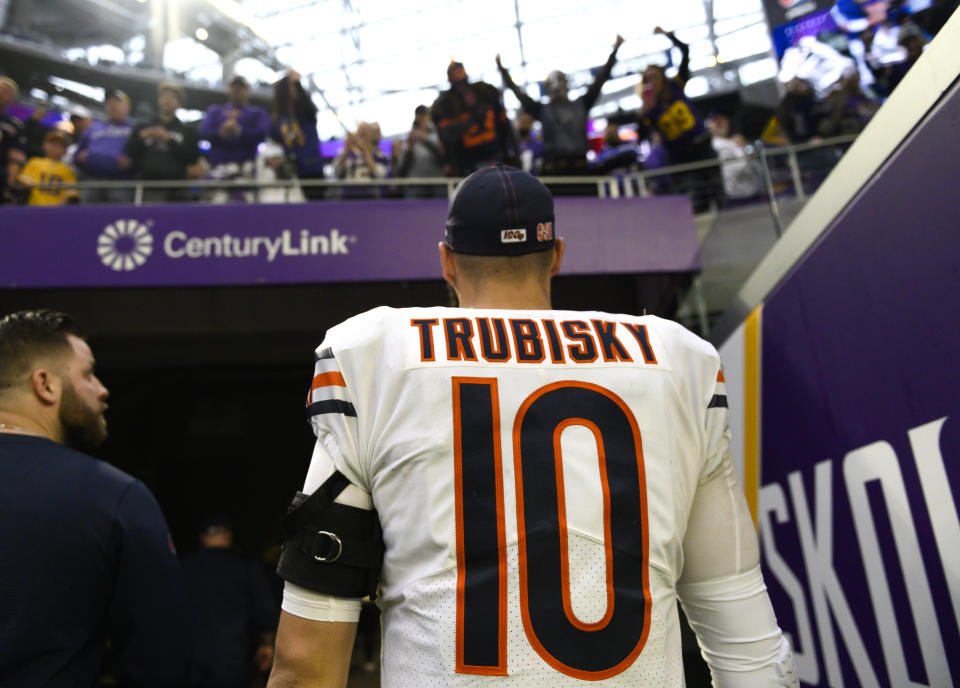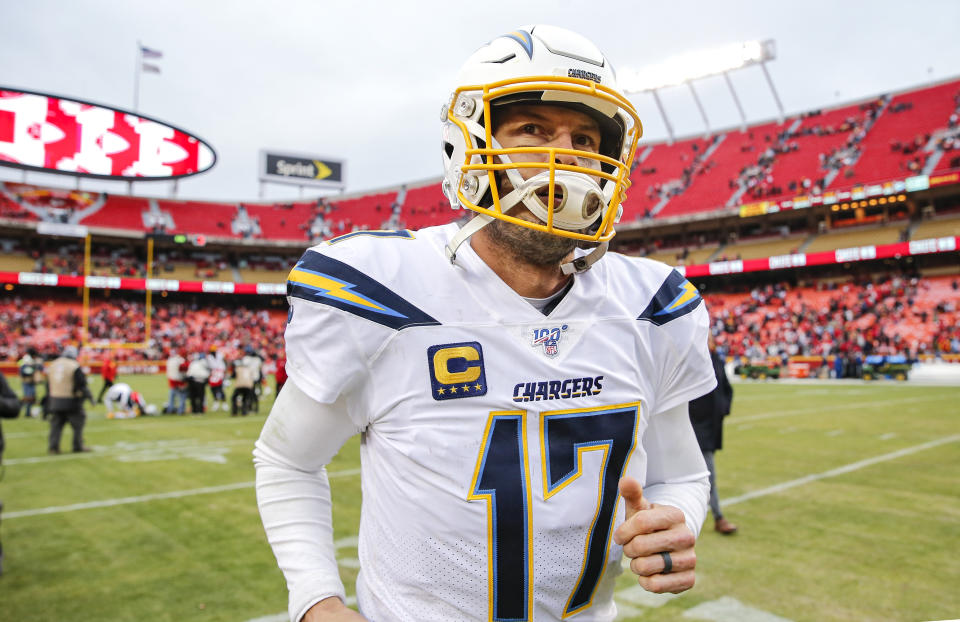Why did the Bears (and other teams) pass on Cam Newton?
It took until June to happen, and it wasn’t for relatively that much money, but Cam Newton is officially off the market.
His signing with the New England Patriots has changed perception for the quarterback market this offseason, even though there’s no escaping the idea that Newton’s health and challenging offseason conditions hurt his cause.
Had there been no coronavirus pandemic, could things have gone differently for the former MVP? Absolutely. A clearer medical picture and no restrictions on teams bringing in free agents for visits might have laid out a completely different marketplace.
Even so, it’s fair to question whether some teams made the right calls at QB.
The Chicago Bears are one of those teams. And maybe we can add the Indianapolis Colts to that list as well. By the end of the 2020 season, a healthy Newton could make more teams feel that way.
It’s true that the Patriots’ patience likely paid off in the form of a discount; according to The Athletic’s Jeff Howe, the Patriots ramped up their interest in Newton only once he “softened his contract demands.”
What was stopping the Bears and other teams from playing their hands similarly?

Competition for the incumbent
The Bears are such a curious study, and their quest for a franchise quarterback is seemingly entering its fourth decade now.
In declining Mitchell Trubisky’s fifth-year option — which is only guaranteed for injury — the Bears sent a message that they’re unhappy with his development. Head coach Matt Nagy and general manager Ryan Pace have now said there’s an “open competition” in Chicago. But in trading for Nick Foles, they’ve simultaneously sent the message that they hope Trubisky can still show something.
Taking on Foles and the $21 million left on his restructured deal (and giving up a fourth-round draft pick to do so) might appear as if he’s the odds-on favorite to win the job at the start of training camp. After all, even Chase Daniel might agree that’s quite a bit for a backup QB.
Couldn’t they have done the same with Newton? At most, Newton could make $7.5 million this season in New England. Foles’ deal looks terrible, even for a QB who led a Super Bowl run not long ago.
Certainly his experience with three Bears coaches — Nagy, plus new assistants John DeFilippo and Bill Lazor — must be weighed into the equation. In this of all offseasons, it seems the Bears wanted a quarterback who can rapidly digest the offense, and the journeyman Foles is regarded as a quick study who should fold right back into the Nagy scheme, which is derivative of the offense Foles ran with the Philadelphia Eagles.
It also appears as if the Bears didn’t want to bring in an alpha dog who could threaten Trubisky. Newton’s talent, experience and charisma all trump that of Trubisky if Newton is healthy. And he could smell blood and steal the starting job the Bears seemingly want Trubisky to keep.
This is the slippery slope the Bears might be playing: They wanted a QB who is good enough to push Trubisky and possibly beat him if needed, but not too good or with too dominant a persona. In other words, they’re trying to butter both sides of the bread.
We’ll leave it up to you, dear reader, to decide whether that’s a smart tactic or completely foolhardy. Especially for a Bears coach and GM whose job security might be directly tied to the team’s performance this coming season.
Were Cam Newton’s injury concerns that worrisome?
If you’re a skeptic about Newton’s health, it’s understandable. His foot injury was bad enough that there was concern about his long-term prognosis. Even though Newton’s recent workout video suggests he is moving around better, there’s no real way to tell whether he is good to go for the short or long terms.
Newton also has a surgically repaired shoulder that caused him to miss the very end of the 2018 season. It’s maybe the lesser of the two worries, but it can’t go overlooked.
His health is a big reason (sans a full medical evaluation) why Newton had to wait so long — and get so little guaranteed money — this offseason.
Doesn’t Foles possess some injury questions too? He suffered a broken clavicle last season that cost him the starting job; Foles got it back briefly late last season but was benched for poor play. It was Foles’ second such injury in the past five years.
Some guys (just ask Aaron Rodgers) appear to be more prone to such things. And did you realize that Foles is six months older than Newton?
Foles has never played a full 16 games in the NFL. Newton, meanwhile, had missed only five of the first 128 regular-season games of his career through December 2018.
And taking it a step further, if the Bears hope Trubisky flourishes, Newton’s health shouldn’t have been as big a concern — and it would have come more cheaply than Foles did.

The Colts might have made an ever bigger mistake
Let’s say, for argument’s sake, Newton is healthy entering training camp.
Which QB would you rather have: a 31-year-old Newton, five years removed from an MVP award and costing as much as a high-priced backup or a soon-to-be 39-year-old Philip Rivers on a $25 million, fully guaranteed deal?
Like with the Bears and Trubisky, the Colts have some coaching-staff familiarity with Rivers. And Rivers, to be fair, hasn’t missed a game with injury since taking over the starting job in 2006.
But if you’re thinking on a salary-to-performance wavelength, Rivers had better be pretty darned good with the Colts in 2020 — far better than his respectable statistics in 2019 might suggest.
The Colts didn’t feel they could take that proverbial next step with Jacoby Brissett, and it’s an understandable point of view. Brissett took steps backward after a strong first eight games in 2019 (64.8 completion percentage, 1,649 pass yards, 14-3 TD-INT ratio), suffering a knee injury that caused him to miss one full game and leading to his late-season struggles (56.40 completion percentage, 1,293 pass yards, 4-3 TD-INT ratio).
Still, it’s not hard to imagine a healthy Newton playing at a level that’s comparable — or superior — to that of Rivers in 2020.
Colts head coach Frank Reich and GM Chris Ballard have beefed up an already good run game this offseason, adding second-rounder Jonathan Taylor and fullback Roosevelt Nix to an offense that ranked seventh in rush yards per game a year ago. Indianapolis wants to dominate up front and open up play-action possibilities, which make sense. Rivers indeed has been a great play-action passer for most of his career. But so has Newton when healthy, and he adds an element to the run game that could have made the Colts’ ground attack even more diverse.
On top of that, the Colts have no clear-cut QB of the future — not even a Trubisky-like player whose fragility they must consider. Brissett is a free agent at season’s end, and Ballard warned us to slow our rolls when it comes to 2020 fourth-rounder Jacob Eason.
We’ll see if Rivers can fill the void the Colts are hoping. Comparing his 2020 performance to that of Newton will end up being fascinating come season’s end.
And if Newton plays anywhere close to the level he was at in the middle of the 2018 season, there will be more teams than just the Bears and Colts who will be regretful they didn’t take a gamble on him.
More from Yahoo Sports:

